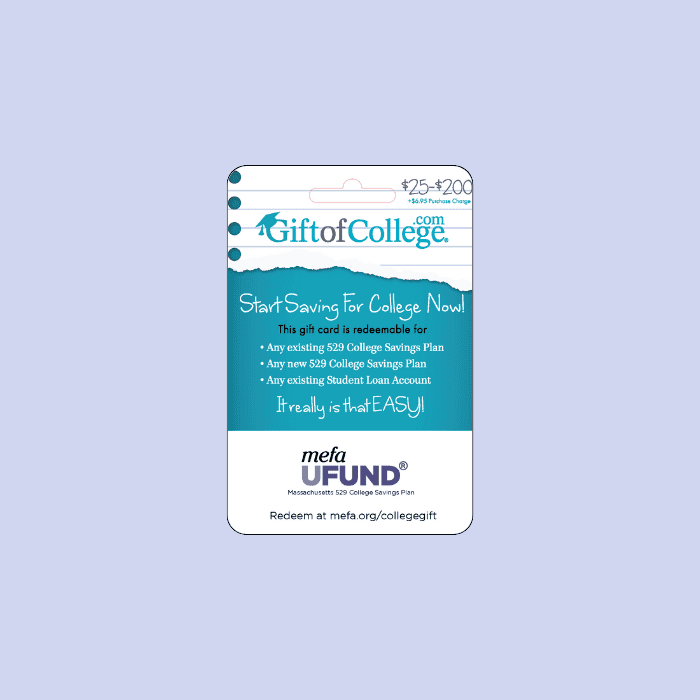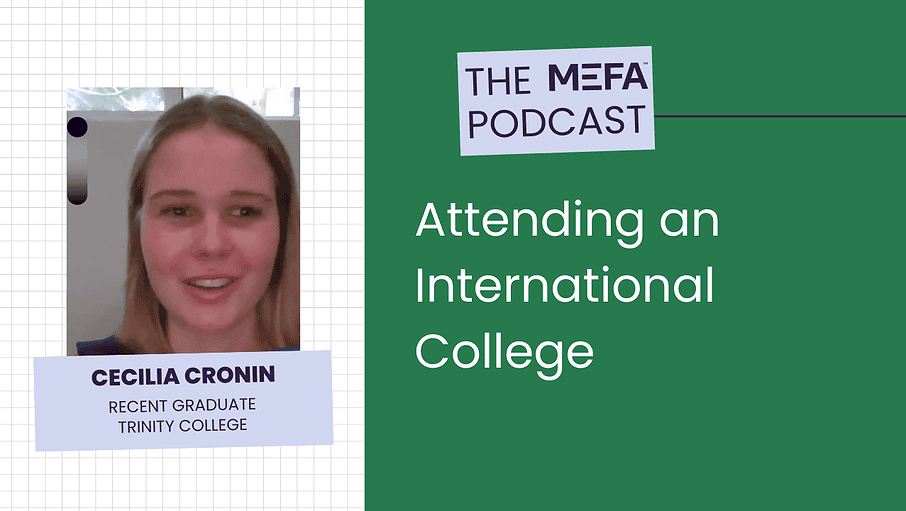

Resources Mentioned in this Episode
Cecilia Cronin: [00:00:00] Yeah, when I was applying to schools it was almost entirely in America, but I did, my older sister studied in France for two years and I really liked That experience that she had just in Europe, they treat you a little bit more like an adult than in the US you have your own apartment. You don’t have any dining hall plans or anything like that. You’re on your own. No, one’s watching over you, taking care of you. So I really liked the idea of studying in Europe.
Jonathan Hughes: Hi folks. And welcome to the MEFA Podcast. My name is Jonathan Hughes, and you just heard from our guest. And so what are we talking about? Let me ask you a question. Have you ever wanted to live in a foreign country? Even better, how about being a college student in a foreign country? [00:01:00] Today’s guest on the show did just that and she has graciously offered to tell us all about how to do it and what her experience has been.
So that if you are one of those students looking to study abroad, particularly in this case, it’s Ireland you’ll find this episode really useful. I know you’ll enjoy this conversation. I won’t keep you from it much longer. I’ll be back after the conversation, but now let’s let our guest introduce herself.
Cecilia Cronin: My name is Cecilia. I’m from Massachusetts, countryside of Boston. I am 22 years old. I just finished my four years at Trinity College Dublin.
Jonathan Hughes: Undergraduate or graduate? I guess it would be undergraduate.
Cecilia Cronin: Undergraduate, yes.
Jonathan Hughes: How did you choose Trinity College Dublin? How did you pick that and was being in another country important or was it just
Cecilia Cronin: Yeah, when I was applying to schools, it was almost entirely in America, but I did my older sister studied in France for two years, and I [00:02:00] really liked that experience that she had just in Europe.
They treat you a little bit more like an adult than in the U. S. You have your own apartment. You don’t have any dining hall plans or anything like that. You’re on your own. No one’s watching over you, taking care of you. So I really liked the idea of studying in Europe, and I only speak English, so I didn’t have a lot of options country wise and I found a program.
at Trinity that I was really interested in. So I applied and that’s where I ended up. It was a little bit random, but I was really happy with the choice I made.
Jonathan Hughes: Now, did you have to apply because I know for graduate schools, it is a little bit different that you have to apply to the program and be admitted into the program. Was it that way as well, or was it just like any other American school?
Cecilia Cronin: Yes, it’s very specific in terms of the course that you apply to. It’s called course instead of major, but it’s the exact same. That’s what you apply to, and that’s what you will be in, and you’re not changing it once you get there, [00:03:00] essentially, and it ranges a lot on how selective, which I think is the case in the U. S. as well, to some regard, but if you’re going for medicine, it’s much, much harder than if you’re going for something else.
Jonathan Hughes: And what did you go for?
Cecilia Cronin: I studied Middle Eastern studies. So my full course was Middle Eastern Jewish and Islamic civilizations and religion.
Jonathan Hughes: And is that something that you knew you wanted to study or is it something that you discovered through? The research into the college and thought that would be interesting.
Cecilia Cronin: So I wanted to do something international. I was studying Arabic in high school, so I was like, okay, I’m interested in the middle East and then I became much more interested in Israel, Palestine that specifically. So when I found this course, I was like, okay, that’s I will be really focused in on that.
So that’s how I decided on it. Also what you should know with. [00:04:00] studying in, I think probably all of Europe, is you’re not taking any core classes or anything like that you would find in American schools. So I was taking six classes a semester on the Middle East and on religion, nothing else, which I really liked the idea of.
Jonathan Hughes: Yeah, I was going to ask you about that. I wasn’t sure how they did it. So you have four years of classes, six classes every semester on your subject matter.
Cecilia Cronin: I thought that was a better way to, actually become an expert or undergraduate equivalent of an expert in the field that I wanted to study in.
Jonathan Hughes: And now that you’re through the program, I imagine you still think that’s the case.
Cecilia Cronin: Yeah, it was a gamble. I could have hated it halfway through and that wouldn’t have been great, but I am very happy with that choice.
Jonathan Hughes: Tell me a little bit more about the application process. So what should people know if they want to apply to a college that’s outside of the United States?
Cecilia Cronin: I can only speak for Trinity, so I don’t know how much [00:05:00] it varies. The application process was a little bit confusing for me because in Ireland, they’ve got a point system, which a lot of European, or really countries around the world do, where everybody sits one big exam at the end of their school year.
And that gives them a point, just like a number and that’s how they can apply. Based on that number they have, if your course is 500 points, but you only got 498, you’re out of luck. Which was confusing for me because I was not sitting that exam. But they were able to convert my SAT and just go based on that.
So you can, if you’re an Irish student, you can apply to 10 different courses. If you’re international, you can only apply to three. So it makes it a little bit selective. In terms of your choices, but yeah, I applied for the one I was interested in. They converted the S. A. T. And they said good enough. But the application itself was not very different than what you would [00:06:00] find in an American school.
Jonathan Hughes: Does that mean you would need to take an S. A. T. in your case?
Cecilia Cronin: Yes. Back when I was applying, everyone was taking the SAT. So I know COVID impacted that a bit. But in my case, I definitely did have to.
Jonathan Hughes: So you must have been just before COVID then, is that right?
Cecilia Cronin: Yes, COVID hit my final year of high school.
Jonathan Hughes: And how did that impact things?
Cecilia Cronin: It was very sad that I didn’t get to finish out the school year or anything like that. And I moved over to Ireland, September of 2020. So it was a stressful move for sure. And they were much, much more locked down than we were over here. My whole first year restaurants were closed all indoor dining and all of that.
Hairdressers were closed a good bit of the time. You couldn’t go outside of five kilometer radius of where you lived. There were checkpoints on the roads and all of that. So it made it tricky to explore new places or anything like that. I did a lot of [00:07:00] traveling my final three years there, but my first year, It was COVID and you weren’t moving from where you were.
Jonathan Hughes: What about getting the visa and financial aid and paying for college and things like that?
Cecilia Cronin: Visa wise, it’s not very difficult. You don’t have to do anything beforehand. You kind of, you show up at the airport. You’ve got your proof that you’re a student there and that you have an address there. I don’t think you need any sort of bank details at that time.
It’s it’s simple, and then they give you like six weeks, I think, and then you go and you prove that you have all the documents you need. You pay 300 euro every year, which was annoying. But it wasn’t very difficult.
Jonathan Hughes: So you get the visa after you show up? Or you go, you get to the airport with your letter admitting you into school or?
Cecilia Cronin: Yeah, pretty much. It’s Ireland. I studied in Israel for one semester, which [00:08:00] I can speak on that visa process, which is very different if you’d like, but in terms of Ireland, yeah, you just show up at the airport. You’re like, I’m going to Trinity. They’re like, Oh, of course, come on. And then you do have to prove a few things afterwards. It’s not a huge thing.
Jonathan Hughes: So you can be admitted, you can show up, all this stuff without the visa, and then you get the visa when you’re there.
Cecilia Cronin: Yes, that’s right.
Jonathan Hughes: Wow, okay. And yeah, please do talk about the Israeli process.
Cecilia Cronin: That one was a little bit more stressful for me because I was used to this very easy way.
Actually, again, being an American, it was very, It was much easier than it could have been otherwise. I had to send documents into the Israeli consulate, which included a fair amount of information. It was like, I needed a lot of different bank details, my flights in and out. I needed my parents passports, which I thought was silly cause I was 21 years old.
And then. Technically, they could have [00:09:00] just sent that form back for me, but they were all over the place. So I did have to go into the consulate to get it as well. Whereas like I had an Irish friend that went over to Israel as well, and she had to go to the embassy and they asked her questions and questions about what her parents did for work and all of that.
But as an American, again, It was much easier for me.
Jonathan Hughes: Huh. So what’s it like living in Ireland as an American then?
Cecilia Cronin: There are a lot of us over there, so it makes it easy. They like Americans fine. They’ll make fun of you. Most people do. But it’s not difficult in terms of any sort of homesickness.
You’ll find other Americans. You’ll find. Thanksgiving celebrations and all of that. And it’s a really easy flight between the two places. And in terms of international flights, it’s actually remarkably cheap as well. So it’s not bad at all.
Jonathan Hughes: Other than the ways we’ve already discussed of, applying directly into the course and not [00:10:00] taking core classes and things like that.
I know it’s a little tricky to ask you because it’s your only college experience, but from what you gather how do they do college? You spoke a little bit about it already when they treat you a little bit more like an adult. But I wonder if you could talk about those things a little bit more.
Cecilia Cronin: Okay, let me think. I think I took more classes than an American typically does. I feel like I usually hear either four or five a semester.
Jonathan Hughes: Are the classes themselves different? Are they bigger? Are they more lecture oriented, do you think?
Cecilia Cronin: You’re not mixing with people from other degrees or anything like that.
So it depends a ton, right? Like I had a very niche topic that I was studying. There were 13 of us. And then And you could choose classes within that. So sometimes you’d have a class up to 20 or something like that. And sometimes, like I had four person classes sometimes, whereas I had friends that studied business and they had massive lectures, just like you would see in [00:11:00] the U S and then they’d have tutorials that were much smaller.
Again, like you would see that are more individualized.
Jonathan Hughes: And were there, were they, more exam heavy do you think? Or, what was that like?
Cecilia Cronin: I did not take a single exam in my time over there.
Jonathan Hughes: Oh, wow.
Cecilia Cronin: Again, that’s what, that’s just my degree. I, wrote essays upon it. I think I wrote over 100 essays while I was over there.
We do have dissertations, which I guess does differ from many American schools. It’s a requirement for your final degree, which was usually around 10, 000 to 15, 000 words. Yeah, I didn’t take any exams again. My friends in business and medicine and all that were always taking exams. So it’s not like they didn’t exist at all.
Jonathan Hughes: Sure. And Trinity, is an unbelievably storied university, right? I think I went. I went to Ireland when I was nine years old, and I think I went to Trinity. I can’t remember exactly. [00:12:00] Is that, is it where they have the Book of Kells?
Cecilia Cronin: Yes. Yeah. If you’ve been to Ireland, you’ve most likely been to Trinity. It’s in the, it’s in the center of Dublin. It’s very picturesque. A lot of people go to the Book of Kells. A lot of people just come in and take photos. We’ve got a really beautiful campus. It’s a big camp a meal. If you’ve been to Dublin, you would remember the sight of that meaning the college was packed with tourists all the time, which could be annoying sometimes. But yeah you’ve been there, I promise.
Jonathan Hughes: And I don’t know how plugged in you were to the financial part of it or, if you know what the cost compared to any colleges in the U. S. that you were considering, did you file a FAFSA to go there? Did what was the paying portion like, if that was part of your experience?
Cecilia Cronin: Financial aid is very limited. You’re not getting any sort of scholarships or really any government help. It is very cheap, though. For, if you’re European, it’s pretty much free. I think they pay [00:13:00] 3, 000 Euro a year or something like that. I remember when I was comparing prices, it would be very similar if I were to do in state tuition to UMass.
It’s not free, but it’s not a private university in America by any means. It’s around the same as a state school.
Jonathan Hughes: Does that include travel and living expenses or no?
Cecilia Cronin: That’s a great question. I don’t remember. I think probably, because We did calculate it very specifically in terms of all the costs. And we said that it would be very similar. I assume I did not include travel expenses on there, but again, flights between Boston and Dublin are not that bad during COVID they were nothing. It’s amazing. Nowadays it’s more, it is an international flight, but it’s not anything huge.
Jonathan Hughes: I’m wondering what was it like finding an apartment? Something, if you’re not living. You’re not living on campus, right? Or are you?
Cecilia Cronin: My first year, they’ve got big student accommodation. It’s not a [00:14:00] dorm. It’s still an apartment. You’re still cooking your own meals. I had six roommates that, luckily, I got along with really well. It was COVID, so I spent every single day with them and no one else.
That was through the school, very easy to set up. And they do have other student accommodations around the city that if you choose not to do the one through the school, you can do that. My younger sister actually went to Trinity as well. She’s still there.
Jonathan Hughes: Did you guys overlap?
Cecilia Cronin: Yes, for two years. I dragged her over there. I was like, you’re coming with me. And she did not live in that college run student accommodation her first year, she lived in a different private one, which was also very easy. But after that, I moved into an apartment with her. Three of my roommates from that first year and we stayed there for the final three years which worked out really well
Jonathan Hughes: It sounds like you are glad that you’ve done it Is it something that you would recommend and if so, what should Americans keep in mind if they do want to study You know the country.
I know you’ve been to Ireland only [00:15:00] in Israel, I suppose but anything that you picked up?
Cecilia Cronin: I very highly recommend it. It gave me the chance to explore other cultures. Ryanair is based in Dublin, so I was zipping around Europe a lot which was an amazing opportunity for me because that’s very cheap as well.
And I really feel strongly that people do need to leave their homes, leave, the bubble of Massachusetts or wherever you’re from, experience more things. It’s not for everyone. If you want to be able to go home on the weekends and do your laundry, that’s not going to happen. And it’s hard to, cause you’re like, your friends are Irish.
They’re going home on the weekends to do their laundry. Their parents are bringing them frozen dinners and all of that. You don’t get that. You do have to accept the fact that you’re long distance with your family. I’m very close to mine and I was so very happy when my sister decided to come with me.
But [00:16:00] you do have to understand that you’re not going home for Thanksgiving. You’re not going home for Easter. There are pros and cons, but I was really happy with the choice I made.
Jonathan Hughes: Are you going to go to graduate school? Do you think, or, and if so, where, what are the plans from now on? And I’m curious.
Cecilia Cronin: I will probably go to graduate school at some point, not yet. I’m taking a break from school for right now. I might go to Spain. I’ve gotten accepted into a little teaching program in Spain, so I’m like, I’m not sure I’m just ready to leave Europe yet. I’m studying for the Foreign Service exam as well. Hoping to go somewhere, do something but I’ve got no definite plans locked down.
Jonathan Hughes: Best of luck to you, whatever you decide to do, and I really do appreciate you coming on.
Cecilia Cronin: Happy to, no problem at all.
Jonathan Hughes: All right, [00:17:00] thank you so much Cecilia, I really appreciate you spending time with us and letting us know about your experience. And folks, if you liked what you heard today on the show and you want to hear more from us on planning. Saving and paying for college and career readiness. Then you can follow the show and you can find us wherever you get your podcasts.
Oh, and please remember to leave a review. It helps us to keep doing what we’re doing and getting the show out to folks like you. I’d like to thank our producer, Shaun Connolly. I’d like to thank AJ Yee, Lisa Rooney, Lauren Danz, and Meredith Clement for their assistance in getting the show posted. Once again, my name is Jonathan Hughes, and this has been the MEFA podcast. Thanks.
Cecilia Cronin: [00:00:00] Yeah, when I was applying to schools it was almost entirely in America, but I did, my older sister studied in France for two years and I really liked That experience that she had just in Europe, they treat you a little bit more like an adult than in the US you have your own apartment. You don’t have any dining hall plans or anything like that. You’re on your own. No, one’s watching over you, taking care of you. So I really liked the idea of studying in Europe.
Jonathan Hughes: Hi folks. And welcome to the MEFA Podcast. My name is Jonathan Hughes, and you just heard from our guest. And so what are we talking about? Let me ask you a question. Have you ever wanted to live in a foreign country? Even better, how about being a college student in a foreign country? [00:01:00] Today’s guest on the show did just that and she has graciously offered to tell us all about how to do it and what her experience has been.
So that if you are one of those students looking to study abroad, particularly in this case, it’s Ireland you’ll find this episode really useful. I know you’ll enjoy this conversation. I won’t keep you from it much longer. I’ll be back after the conversation, but now let’s let our guest introduce herself.
Cecilia Cronin: My name is Cecilia. I’m from Massachusetts, countryside of Boston. I am 22 years old. I just finished my four years at Trinity College Dublin.
Jonathan Hughes: Undergraduate or graduate? I guess it would be undergraduate.
Cecilia Cronin: Undergraduate, yes.
Jonathan Hughes: How did you choose Trinity College Dublin? How did you pick that and was being in another country important or was it just
Cecilia Cronin: Yeah, when I was applying to schools, it was almost entirely in America, but I did my older sister studied in France for two years, and I [00:02:00] really liked that experience that she had just in Europe.
They treat you a little bit more like an adult than in the U. S. You have your own apartment. You don’t have any dining hall plans or anything like that. You’re on your own. No one’s watching over you, taking care of you. So I really liked the idea of studying in Europe, and I only speak English, so I didn’t have a lot of options country wise and I found a program.
at Trinity that I was really interested in. So I applied and that’s where I ended up. It was a little bit random, but I was really happy with the choice I made.
Jonathan Hughes: Now, did you have to apply because I know for graduate schools, it is a little bit different that you have to apply to the program and be admitted into the program. Was it that way as well, or was it just like any other American school?
Cecilia Cronin: Yes, it’s very specific in terms of the course that you apply to. It’s called course instead of major, but it’s the exact same. That’s what you apply to, and that’s what you will be in, and you’re not changing it once you get there, [00:03:00] essentially, and it ranges a lot on how selective, which I think is the case in the U. S. as well, to some regard, but if you’re going for medicine, it’s much, much harder than if you’re going for something else.
Jonathan Hughes: And what did you go for?
Cecilia Cronin: I studied Middle Eastern studies. So my full course was Middle Eastern Jewish and Islamic civilizations and religion.
Jonathan Hughes: And is that something that you knew you wanted to study or is it something that you discovered through? The research into the college and thought that would be interesting.
Cecilia Cronin: So I wanted to do something international. I was studying Arabic in high school, so I was like, okay, I’m interested in the middle East and then I became much more interested in Israel, Palestine that specifically. So when I found this course, I was like, okay, that’s I will be really focused in on that.
So that’s how I decided on it. Also what you should know with. [00:04:00] studying in, I think probably all of Europe, is you’re not taking any core classes or anything like that you would find in American schools. So I was taking six classes a semester on the Middle East and on religion, nothing else, which I really liked the idea of.
Jonathan Hughes: Yeah, I was going to ask you about that. I wasn’t sure how they did it. So you have four years of classes, six classes every semester on your subject matter.
Cecilia Cronin: I thought that was a better way to, actually become an expert or undergraduate equivalent of an expert in the field that I wanted to study in.
Jonathan Hughes: And now that you’re through the program, I imagine you still think that’s the case.
Cecilia Cronin: Yeah, it was a gamble. I could have hated it halfway through and that wouldn’t have been great, but I am very happy with that choice.
Jonathan Hughes: Tell me a little bit more about the application process. So what should people know if they want to apply to a college that’s outside of the United States?
Cecilia Cronin: I can only speak for Trinity, so I don’t know how much [00:05:00] it varies. The application process was a little bit confusing for me because in Ireland, they’ve got a point system, which a lot of European, or really countries around the world do, where everybody sits one big exam at the end of their school year.
And that gives them a point, just like a number and that’s how they can apply. Based on that number they have, if your course is 500 points, but you only got 498, you’re out of luck. Which was confusing for me because I was not sitting that exam. But they were able to convert my SAT and just go based on that.
So you can, if you’re an Irish student, you can apply to 10 different courses. If you’re international, you can only apply to three. So it makes it a little bit selective. In terms of your choices, but yeah, I applied for the one I was interested in. They converted the S. A. T. And they said good enough. But the application itself was not very different than what you would [00:06:00] find in an American school.
Jonathan Hughes: Does that mean you would need to take an S. A. T. in your case?
Cecilia Cronin: Yes. Back when I was applying, everyone was taking the SAT. So I know COVID impacted that a bit. But in my case, I definitely did have to.
Jonathan Hughes: So you must have been just before COVID then, is that right?
Cecilia Cronin: Yes, COVID hit my final year of high school.
Jonathan Hughes: And how did that impact things?
Cecilia Cronin: It was very sad that I didn’t get to finish out the school year or anything like that. And I moved over to Ireland, September of 2020. So it was a stressful move for sure. And they were much, much more locked down than we were over here. My whole first year restaurants were closed all indoor dining and all of that.
Hairdressers were closed a good bit of the time. You couldn’t go outside of five kilometer radius of where you lived. There were checkpoints on the roads and all of that. So it made it tricky to explore new places or anything like that. I did a lot of [00:07:00] traveling my final three years there, but my first year, It was COVID and you weren’t moving from where you were.
Jonathan Hughes: What about getting the visa and financial aid and paying for college and things like that?
Cecilia Cronin: Visa wise, it’s not very difficult. You don’t have to do anything beforehand. You kind of, you show up at the airport. You’ve got your proof that you’re a student there and that you have an address there. I don’t think you need any sort of bank details at that time.
It’s it’s simple, and then they give you like six weeks, I think, and then you go and you prove that you have all the documents you need. You pay 300 euro every year, which was annoying. But it wasn’t very difficult.
Jonathan Hughes: So you get the visa after you show up? Or you go, you get to the airport with your letter admitting you into school or?
Cecilia Cronin: Yeah, pretty much. It’s Ireland. I studied in Israel for one semester, which [00:08:00] I can speak on that visa process, which is very different if you’d like, but in terms of Ireland, yeah, you just show up at the airport. You’re like, I’m going to Trinity. They’re like, Oh, of course, come on. And then you do have to prove a few things afterwards. It’s not a huge thing.
Jonathan Hughes: So you can be admitted, you can show up, all this stuff without the visa, and then you get the visa when you’re there.
Cecilia Cronin: Yes, that’s right.
Jonathan Hughes: Wow, okay. And yeah, please do talk about the Israeli process.
Cecilia Cronin: That one was a little bit more stressful for me because I was used to this very easy way.
Actually, again, being an American, it was very, It was much easier than it could have been otherwise. I had to send documents into the Israeli consulate, which included a fair amount of information. It was like, I needed a lot of different bank details, my flights in and out. I needed my parents passports, which I thought was silly cause I was 21 years old.
And then. Technically, they could have [00:09:00] just sent that form back for me, but they were all over the place. So I did have to go into the consulate to get it as well. Whereas like I had an Irish friend that went over to Israel as well, and she had to go to the embassy and they asked her questions and questions about what her parents did for work and all of that.
But as an American, again, It was much easier for me.
Jonathan Hughes: Huh. So what’s it like living in Ireland as an American then?
Cecilia Cronin: There are a lot of us over there, so it makes it easy. They like Americans fine. They’ll make fun of you. Most people do. But it’s not difficult in terms of any sort of homesickness.
You’ll find other Americans. You’ll find. Thanksgiving celebrations and all of that. And it’s a really easy flight between the two places. And in terms of international flights, it’s actually remarkably cheap as well. So it’s not bad at all.
Jonathan Hughes: Other than the ways we’ve already discussed of, applying directly into the course and not [00:10:00] taking core classes and things like that.
I know it’s a little tricky to ask you because it’s your only college experience, but from what you gather how do they do college? You spoke a little bit about it already when they treat you a little bit more like an adult. But I wonder if you could talk about those things a little bit more.
Cecilia Cronin: Okay, let me think. I think I took more classes than an American typically does. I feel like I usually hear either four or five a semester.
Jonathan Hughes: Are the classes themselves different? Are they bigger? Are they more lecture oriented, do you think?
Cecilia Cronin: You’re not mixing with people from other degrees or anything like that.
So it depends a ton, right? Like I had a very niche topic that I was studying. There were 13 of us. And then And you could choose classes within that. So sometimes you’d have a class up to 20 or something like that. And sometimes, like I had four person classes sometimes, whereas I had friends that studied business and they had massive lectures, just like you would see in [00:11:00] the U S and then they’d have tutorials that were much smaller.
Again, like you would see that are more individualized.
Jonathan Hughes: And were there, were they, more exam heavy do you think? Or, what was that like?
Cecilia Cronin: I did not take a single exam in my time over there.
Jonathan Hughes: Oh, wow.
Cecilia Cronin: Again, that’s what, that’s just my degree. I, wrote essays upon it. I think I wrote over 100 essays while I was over there.
We do have dissertations, which I guess does differ from many American schools. It’s a requirement for your final degree, which was usually around 10, 000 to 15, 000 words. Yeah, I didn’t take any exams again. My friends in business and medicine and all that were always taking exams. So it’s not like they didn’t exist at all.
Jonathan Hughes: Sure. And Trinity, is an unbelievably storied university, right? I think I went. I went to Ireland when I was nine years old, and I think I went to Trinity. I can’t remember exactly. [00:12:00] Is that, is it where they have the Book of Kells?
Cecilia Cronin: Yes. Yeah. If you’ve been to Ireland, you’ve most likely been to Trinity. It’s in the, it’s in the center of Dublin. It’s very picturesque. A lot of people go to the Book of Kells. A lot of people just come in and take photos. We’ve got a really beautiful campus. It’s a big camp a meal. If you’ve been to Dublin, you would remember the sight of that meaning the college was packed with tourists all the time, which could be annoying sometimes. But yeah you’ve been there, I promise.
Jonathan Hughes: And I don’t know how plugged in you were to the financial part of it or, if you know what the cost compared to any colleges in the U. S. that you were considering, did you file a FAFSA to go there? Did what was the paying portion like, if that was part of your experience?
Cecilia Cronin: Financial aid is very limited. You’re not getting any sort of scholarships or really any government help. It is very cheap, though. For, if you’re European, it’s pretty much free. I think they pay [00:13:00] 3, 000 Euro a year or something like that. I remember when I was comparing prices, it would be very similar if I were to do in state tuition to UMass.
It’s not free, but it’s not a private university in America by any means. It’s around the same as a state school.
Jonathan Hughes: Does that include travel and living expenses or no?
Cecilia Cronin: That’s a great question. I don’t remember. I think probably, because We did calculate it very specifically in terms of all the costs. And we said that it would be very similar. I assume I did not include travel expenses on there, but again, flights between Boston and Dublin are not that bad during COVID they were nothing. It’s amazing. Nowadays it’s more, it is an international flight, but it’s not anything huge.
Jonathan Hughes: I’m wondering what was it like finding an apartment? Something, if you’re not living. You’re not living on campus, right? Or are you?
Cecilia Cronin: My first year, they’ve got big student accommodation. It’s not a [00:14:00] dorm. It’s still an apartment. You’re still cooking your own meals. I had six roommates that, luckily, I got along with really well. It was COVID, so I spent every single day with them and no one else.
That was through the school, very easy to set up. And they do have other student accommodations around the city that if you choose not to do the one through the school, you can do that. My younger sister actually went to Trinity as well. She’s still there.
Jonathan Hughes: Did you guys overlap?
Cecilia Cronin: Yes, for two years. I dragged her over there. I was like, you’re coming with me. And she did not live in that college run student accommodation her first year, she lived in a different private one, which was also very easy. But after that, I moved into an apartment with her. Three of my roommates from that first year and we stayed there for the final three years which worked out really well
Jonathan Hughes: It sounds like you are glad that you’ve done it Is it something that you would recommend and if so, what should Americans keep in mind if they do want to study You know the country.
I know you’ve been to Ireland only [00:15:00] in Israel, I suppose but anything that you picked up?
Cecilia Cronin: I very highly recommend it. It gave me the chance to explore other cultures. Ryanair is based in Dublin, so I was zipping around Europe a lot which was an amazing opportunity for me because that’s very cheap as well.
And I really feel strongly that people do need to leave their homes, leave, the bubble of Massachusetts or wherever you’re from, experience more things. It’s not for everyone. If you want to be able to go home on the weekends and do your laundry, that’s not going to happen. And it’s hard to, cause you’re like, your friends are Irish.
They’re going home on the weekends to do their laundry. Their parents are bringing them frozen dinners and all of that. You don’t get that. You do have to accept the fact that you’re long distance with your family. I’m very close to mine and I was so very happy when my sister decided to come with me.
But [00:16:00] you do have to understand that you’re not going home for Thanksgiving. You’re not going home for Easter. There are pros and cons, but I was really happy with the choice I made.
Jonathan Hughes: Are you going to go to graduate school? Do you think, or, and if so, where, what are the plans from now on? And I’m curious.
Cecilia Cronin: I will probably go to graduate school at some point, not yet. I’m taking a break from school for right now. I might go to Spain. I’ve gotten accepted into a little teaching program in Spain, so I’m like, I’m not sure I’m just ready to leave Europe yet. I’m studying for the Foreign Service exam as well. Hoping to go somewhere, do something but I’ve got no definite plans locked down.
Jonathan Hughes: Best of luck to you, whatever you decide to do, and I really do appreciate you coming on.
Cecilia Cronin: Happy to, no problem at all.
Jonathan Hughes: All right, [00:17:00] thank you so much Cecilia, I really appreciate you spending time with us and letting us know about your experience. And folks, if you liked what you heard today on the show and you want to hear more from us on planning. Saving and paying for college and career readiness. Then you can follow the show and you can find us wherever you get your podcasts.
Oh, and please remember to leave a review. It helps us to keep doing what we’re doing and getting the show out to folks like you. I’d like to thank our producer, Shaun Connolly. I’d like to thank AJ Yee, Lisa Rooney, Lauren Danz, and Meredith Clement for their assistance in getting the show posted. Once again, my name is Jonathan Hughes, and this has been the MEFA podcast. Thanks.















